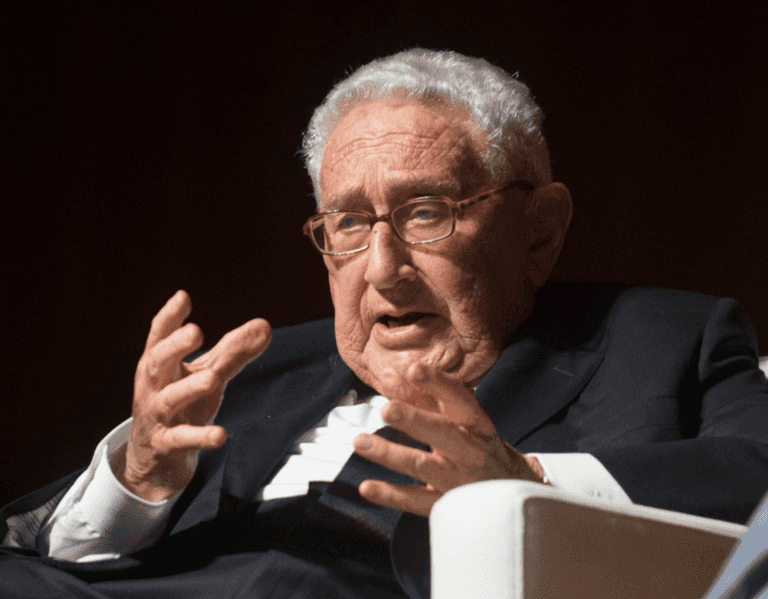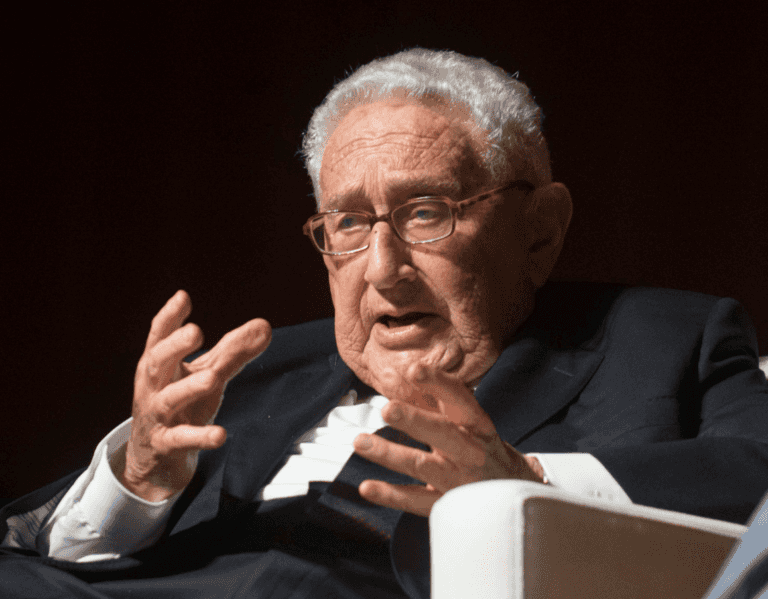
This article was originally published by Radio Free Asia and is reprinted with permission.
Veteran U.S. negotiator Henry Kissinger held talks with China’s top diplomat and the country’s defense minister, somewhat upstaging a three-day visit by United States climate envoy John Kerry.
The former secretary of state, now 100 years old, was key to U.S. rapprochement with China half a century ago. His visit to Beijing was unannounced, although the U.S. State Department said it was aware of his trip, which he undertook “under his own volition.”
Kissinger met with Chinese Defense Minister Li Shangfu on Tuesday, according to a state media report that was also posted on the ministry’s website. On Wednesday he met with Wang Yi, China’s top foreign affairs official.
Wang reinforced China’s position on Taiwan, telling Kissinger independence was “incompatible with peace across the Taiwan Strait,” according to a statement by China’s foreign ministry.
“China’s development has a strong … momentum and inevitable historical logic, and it is impossible to try to transform China, and it is even more impossible to encircle and contain China,” Wang said.
Kissinger told Wang that China and the U.S. should treat each other as equals and maintain contact “no matter how difficult it is,” the ministry said.
The U.S. State Department indicated that Kissinger was not representing the U.S. in Beijing.
“I will say he was there under his own volition, not acting on behalf of the United States Government. And I don’t have any further updates on his trip,” said State Department spokesperson Matthew Miller.
Miller added that it was not his understanding that Kissinger’s meeting violated any sanctions.
“In fact, we have said that we believe … our own secretary of defense could meet with the sanctioned defense minister, and that would be appropriate to do so,” Miller added.
China has frozen high-level military dialogue with the U.S. because the Biden administration refuses to lift sanctions imposed on the defense minister in 2018.
Li declined to sit down and talk to U.S. Defense Secretary Lloyd Austin at a security forum in Singapore earlier this year.
Li told Kissinger “friendly communication” between China and the U.S. had been “destroyed” because “some people in the United States did not meet China halfway,” a readout from the Defense Ministry said. It added Kissinger said he was a “friend of China,” words that have a lot of traction in Beijing.
The Chinese statement reported Kissinger as saying, “Neither the United States nor China can afford to treat the other as an adversary. If the two countries go to war, it will not lead to any meaningful results for the two peoples.”
Li Haidong, a professor at the China Foreign Affairs University, told the Global Times on Tuesday that Kissinger’s role in China-U.S. relations is “indeed unique and currently irreplaceable.
“His visit to China this time is expected to have a positive impact on improving the current situation of limited military exchanges between China and the U.S.,” the professor said. “At the very least, it has facilitated the normalization of communication channels between the two sides.”
A venerated figure
Kissinger may be something of a polarizing figure in international diplomacy – renowned for his conciliatory approach to China – but it’s difficult to overstate his importance in U.S.-China relations.
He played a pivotal role in shaping the diplomatic rapprochement between the two countries in the early 1970s. He was the first U.S. official to visit China secretly in July 1971, paving the way for President Nixon’s historic trip to Beijing in 1972. He helped to establish the framework of engagement and cooperation that guided the bilateral relationship for decades.
China’s ambassador to the U.S., Xie Feng, visited Kissinger in May to express his best wishes for the former U.S. official’s 100th birthday and in 2019 President Xi sat down with Kissinger in the Great Hall of the People in Tiananmen Square.
However, Kissinger’s warm welcome in Beijing does not necessarily mean a warm welcome for senior Biden administration aides, who have been petitioning Beijing to open up communications as an increasingly bellicose Xi calls for war preparedness.
The U.S. admiral in charge of the Indo-Pacific Command said Tuesday that attempts to reach out to Chinese counterparts have been “disregarded or declined, including a recent invitation to attend the annual chiefs of defense conference in Fiji next month,” Bloomberg reported.
Climate talks
The surprise trip comes as John Kerry continued a Beijing visit, meeting Chinese officials to discuss how the two countries can cooperate on confronting the climate crisis.
Kissinger and Kerry are the latest in a string of senior U.S. officials who have traveled to China this summer. U.S. Secretary of State Antony Blinken visited last month.
Kerry’s third trip to China as U.S. special presidential envoy for climate may have cautiously restarted dialogue over global warming, but there were no major breakthroughs from his three-day visit, which wound up Wednesday.
The U.S. climate envoy met with China’s Vice President Han Zheng on Wednesday, his final day of talks in Beijing.
“Over the course of the last few years the relationship between the United States and China has faced complications,” Kerry said, as he opened talks with Han, according to a report by Bloomberg.
Kerry met Tuesday with Premier Li Qiang, but was not granted an audience with Xi Jinping, who last month had talks with Secretary of State Antony Blinken.
On Tuesday, Xi warned that China will not have its path to curb emissions dictated by others.
“The path, method, pace and intensity to achieve this goal should and must be determined by ourselves, and will never be influenced by others,” Xi said at a national conference on environmental protection, according to state broadcaster China Central Television.
Kerry called for cooperation between the world’s top two polluters since arriving Sunday. He’s expressed concerns that China is continuing to add more coal-fired power even as it rolls out renewable energy at a rapid clip.
“If we can come together over these next months leading up to COP28, which will be the most important since Paris, we will have an opportunity to be able to make a profound difference on this issue,” Kerry said, referring to the United Nations climate summit which begins November in Dubai.
American Military News Rephrased By: InfoArmed
